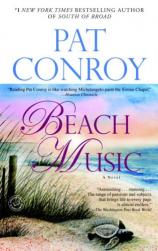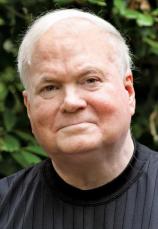Reading Group Guide
Discussion Questions
Beach Music

1. Conroy's fiction has always been imbued with cadences particular to the South, and Beach Music is no exception. How much do you feel that the narrative voice is both affected and informed by place? If we removed all references to the South from this work, do you believe that you would be able to situate it geographically based solely on voice and style alone? If so, what are the salient features that make this a particularly Southern novel, even though much of the action takes place abroad?
2. The novel repeatedly points out the difficulty of maintaining any sort of faith in the face of great despair. Following his mother's death, Max Rusoff finds himself "cursing God's name and cursing him especially for making people hopeless before he graciously allowed them to die" (180). It cannot be argued against that there is an ample, abundantly sad beauty to the world that Conroy reveals, but is there any hope here, and if so, where does it make itself evident? How can we retain faith and hope against the catastrophic backdrop of events in our own present world (e.g., Croatia, Rwanda, Oklahoma City)?
3. A case can be made that laughter, in the McCall family, functions as the ultimate coping mechanism--but one with a definite downside. Jack concedes: "We used laughter as both a weapon and a vaccine" (206). Can you isolate instances in the novel where a character utilizes laughter when another coping mechanism might be more effective?
4. It is patent in every phrase and sentence that Jack both reveres and reviles the institution of family. On the one hand, it is understandable that after the pain of the custody trial, he would want to remove both himself and Leah from the association of his in-laws. But what of his own family? What evidence is there to explain his refusal to maintain contact with them when they acquitted themselves so well in coming to his defense?
5. Jack repeatedly makes allusions to life as a "sweepstakes." Jordan claims: " `God made a terrible mistake. He delivered me to the wrong people' " (281). There is a definite tenor that much of the events in a life can be attributed to random chance or the activities of some outside agent. Do you believe that all of these characters are mere victims of one grand crap shoot, helpless pawns in some other being's larger design? Or do you see them exerting an element of control and choice over their circumstances, which they themselves are perhaps unaware of? What about in your own world: Are you a driver or a passenger?
6. Time's arrow never moves in a line here, neither straight into the future, nor directly back into the past. Instead, it winds and weaves, now backward, now forward again, repeating on itself, and taking on the texture of waves. What effect does this technique contribute to the tale--what is present here that would be lost--had Conroy adopted a more linear approach in the telling?
7. Concerning Shyla's suicide and its aftermath, the narrator claims: "Shyla was the rarest of suicides: no one held her responsible for the act itself; she was forgiven as instantly as she was missed . . ." (4). Granting that this statement is true, why do we normally blame the suicide? Who does Jack blame for Shyla's death? Whose failing do you see as being greater and/or who do you hold most accountable: the individual, the close family and friends, or society at large? Further, Jack feels personally that had he known of Shyla's obsession, he could have helped her more. Is this just a typical survivor's reaction, or do you find some merit in this?
8. John Hardin's brothers, in their quest to deal with his emotional problems, make free use of their characteristic sarcasm, caustic wit, and irony. What effect, if any, do you believe this treatment has on John Hardin? In what other ways might you imagine them treating him differently, and what effects do you imagine such changes would make? Are family members' behavior more a cause or an effect of mental illness?
9. Ledare accuses: "`None of you men will be satisfied until bulimia becomes part of the wedding vows'" (155). Do you believe this is true? Is modern women's obsession with personal appearance imposed on them by men, by other women, or from within? How does beauty work in the novel to help/hinder the women who possess it?
10. In the first portion of the story, Jack seems tired, bored--even annoyed--with Ruth's and George's repeated references to the Holocaust. Yet, when he finally hears their individual stories, Jack, as well as the reader, must come face-to-face with the fact that, as horrible as they are, these are only two told stories. In spite of the relative comforts of time and distance, it is very difficult for the reader to look at these almost unimaginable images that are held up for our inspection. What value does the telling of these unspeakable tales hold for Jack, and further, what value do they hold for the modern reader?
11. Jack blames Shyla's parents for her sadness and his own parents for many of their children's problems. Dallas asks: "`Can you ever forgive Mom and Dad for being exactly who they were born to be?'" (97). Is the wish to have one's parents be something different a futile desire for the leopard to change its spots? How do you assess Jack's own talents when it comes to child rearing?
12. Jack speaks of his own sense of helplessness as a child when witnessing violent acts. Yet, in a sense, he subjects Leah to the same emotions when he beats up Mimmo DeAngelo, even if it is in defense of Mimmo's wife, Sophia. Is Conroy perhaps showing us here, with brutal honesty, that it is impossible to escape our own genetic/environmental past? Do you believe that it is possible to break out of our familial molds, or is each generation doomed to re-create in some fashion the wrongs of its predecessor?
13. It is interesting that Capers--arguably one of the least sympathetic characters in the novel--is often granted the discerning vision of the realist. "`Yours, Jack, is a world of either-or, all or nothing'" (153). With one sentence, he nails the fact that the very same fault that Jack finds with Catholicism, Judaism, and zealous patriotism--the extremity of it all--is one that he is guilty of himself. Is it just human nature, or is it a tragic flaw peculiar to Jack, this inability to see the thing we hate in ourselves, and so turn it outward on humanity?
14. It can be said that "place" almost functions as another character in this book. Vietnam. The South. Poland. These are places that elicit such monolithic images and association in our memory that they are as much about ideas as they are about geography. In light of this, what do you make of Jack's choice of Italy as a refuge for himself and Leah?
15. It used to be a standard joke among mental health professionals in the seventies that a paranoiac was merely a realist who saw life too clearly. Applying this view of the paranoiac to the more general neurosis and psychosis of Shyla and John Hardin, what is your opinion of their so-called "illnesses" and the manifestations of them? What is your interpretation of some of the specific ideas they hold or actions they perform (e.g., John Hardin building a coffin as the perfect present for his not-quite-dead Mama) that society in general might label as mad or, at the very least, disturbed?
16. Jack's juvenile complacency on the moral high ground is shaken by an earthquake of stories that reaches out from the past, rattling the very foundations of his existence. George says: "`Let me test you to the limit and find out where civilization ends and depravity begins along the edges of your soul'" (505). After hearing George's story, does Jack feel that George should have--could have--behaved any differently? Do you? Who has the right to sit in judgment on George? In a related issue, during the mock trial everyone--except for the General--finds Jordan not guilty and they exonerate him. All well and good, we might say. But what do you believe the parents of the dead boy and girl might say?
17. One of the chief problems peculiar to the confessional first-person mode is the inherent difficulty of separating the storyteller from the story, the dancer from the dance. Elsewhere, Conroy has stated that: ". . . my father's violence is the central fact of my art and my life." To what extent do you believe that Jack's views are Conroy's views? At what points, if any, do you feel that they diverge? Finally, can you find instances where Conroy steps back and is actually critical of Jack?
18. Virtually all of the characters here are affected in some way by the concept of masks--both metaphorical and literal--and the converse issue of nakedness. At one extreme, we have Lucy calling for her makeup first thing after waking from a near-death coma. At the other end of the spectrum, we have John Hardin talking to the turtle ladies on the beach while stark naked. Is the relative ability to don masks or abide one's own nakedness an asset or a hindrance to these characters? How is the mask/nakedness issue related to both the physical and emotional survival of other characters, particularly the Foxes?
19. When reviewing the activities of World War II, many social historians and critics have found the German citizenry, who did nothing, to be as greatly to blame as the Nazi soldiers who actually committed the atrocities. Further, Shyla clearly has drawn parallels in her mind between World War II and the American involvement in Vietnam. From your own viewpoint, do you see any parallels between the two wars, and if so, how culpable do you find the American people who didn't fight, didn't resist, but just sat at home while it happened?
20. John Hardin speaks for many characters in the novel, as well as real-life codependents everywhere, when he says: "`I'm the victim of a dysfunctional family . . . I'm not responsible for the actions I commit . . .'" (589). This kind of alibi has become the rallying cry of a whole generation: ours. How does Conroy's opus make you feel about such catch phrases of the self-help movement?
21. We see much inflexibility here: Catholic; Judaic; militaristic. Capers says: "`Rules are a form of discipline. They have their own reason for existing'" (430). And Martha says of George, "`he thought he was being a good Jew'"; to which Jack responds, "`And a bad human being'" (64). Whose intolerance is greater: George's or Jack's? Is it the code that is wrong or the unwillingness to respect it? Think of the religions with which you are most familiar. Then think of your definition of a good human being. Do you think it is possible to adhere to the tenets of any religion exactly to the letter of the law and still remain at all times a "good" human being?
Beach Music
- Publication Date: November 30, -0001
- Genres: Fiction
- Paperback: 800 pages
- Publisher: Dial Press Trade Paperback
- ISBN-10: 0553381539
- ISBN-13: 9780553381535








